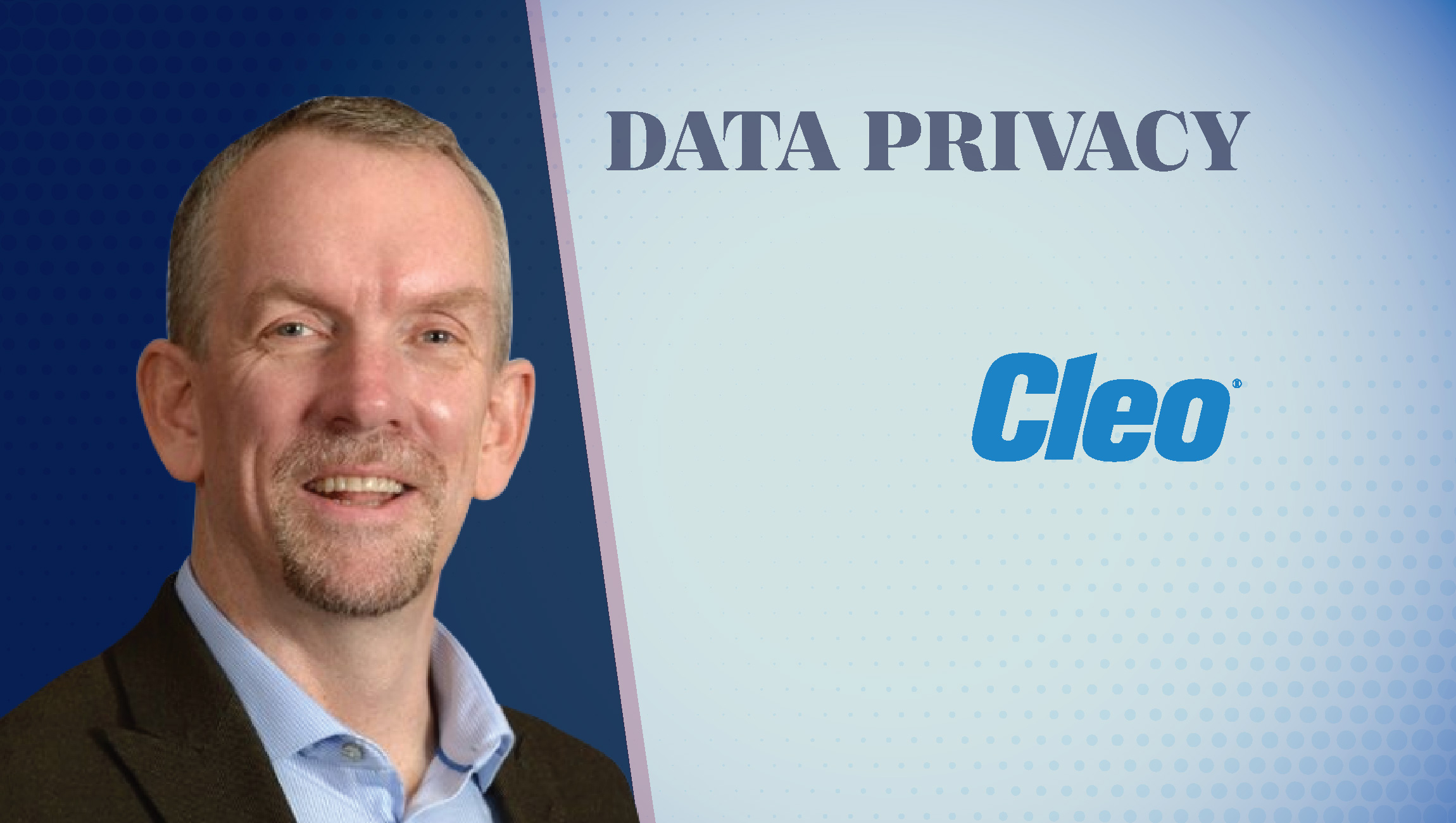Tell us about your role and the team/technology you handle at Cleo.
In my current role as VP of Solutions, I lead the solutions team which sits at the intersection between business and technology at Cleo. We work with our customers to understand their end-to-end business processes, where they might be experiencing challenges, and show how Cleo’s technology can fix those issues. Our key focus is on technology for ecosystem integration – enabling our customers to build out end-to-end integrations between their partner ecosystem and internal and cloud environments and maintain visibility and governance over those integrations. We give companies the power to quickly identify risk, address data errors, pinpoint potential compliance violations, and rapidly resolve issues, allowing them to maintain compliance with everything from HIPAA and GDPR, to customer SLAs and other industry mandates.
Will GDPR continue to impact data companies? How?
GDPR will absolutely continue to impact data companies. Since GDPR went live in 2018, more than 95,000 complaints have resulted in sizable fines for some of the world’s largest retailers, including Amazon, Apple, and Google. GDPR fines continue to be issued on a monthly basis – mainly to companies based in Europe – but the actions so far have shown the regulations have real teeth and the fines can be substantial. In the Netherlands, for example, regulators fined a Dutch bank €48,000 for its failure to respond in a timely fashion to a customer’s request to see data.
While the European GDPR legislation led the way, it’s now been rapidly followed by the California Consumer Privacy Act (CCPA) which was signed into law in June 2018 and will take effect in January 2020. Nine other states already have similar legislation in draft form based on either GDPR or CCPA.
My prediction is that the other shoe is still to drop for companies based outside the EU, so data companies need to keep a tight focus on these requirements and those coming down the track such as CCPA.
How does Cleo tackle the various Data Management challenges that enterprises encounter?
In an effort to understand data privacy regulations and maintain compliance, it’s become clear that a large number of organizations simply don’t know the true whereabouts of their customers’ data, never mind how that data is being used. One of the key challenges many organizations have is that their integrations between their internal systems and their customers, suppliers and trading partners’ systems have evolved over time. They end up with a spaghetti of integrations that are difficult to control and govern, let alone audit and maintain compliance with data protection and privacy regulations.
Cleo provides a single integration platform that starts with a focus on external interactions – looking at end-to-end business flows from the outside-in – to create a consistent, controllable and auditable integration solutions.
What is the role of AI, ML, and DevOps in your current tech roadmap to build B2B solutions?
Let’s start with DevOps. This has simply become the way that organizations develop, deploy and manage software. For Cleo’s cloud offering, DevOps is a fundamental tenet of how the system is managed, maintained and upgraded. The more reliable and streamlined the pipeline, from development to production, the more rapidly and reliably we can innovate to bring new capabilities to our customers. We then share the best practices and components from our own cloud to customers who wish to deploy Cleo’s software within their own cloud or data center.
AI and ML get more to the heart of the future of integration technology. At Cleo, we have many years of experience working with thousands of customers on B2B integrations. This gives us an extensive set of base data to build from and provide more automated integration building functionality. We split this into two tracks – “smart integration” and “intelligent assisted integration”. For us, “smart integration” implies that we have enough data and experience of the integration flow being built that we can provide an automated template that fully encapsulates the integration flow – making it effectively a “plug and play” solution.
“Intelligent assisted integration” on the other hand, provides recommendations and guidance where we don’t have enough data to recommend a full smart integration. Our experience has shown that suggesting complete automation templates with an incomplete data set leads to a longer integration time. This is due in part to the fact that the integrator has to dissect and understand the output of the automated process in order to fix issues, which can be more time consuming than doing the integration from scratch. For these integrations, we get the greatest ROI by using intelligence to guide the integrator to the right path, rather than trying to automate the whole process and then leaving the integrator with the job of picking up the pieces.
How is the North American Data Integration market different from European and APAC markets? How do you plan to grow your customer base in the lagging markets?
We see a more conservative approach to Data Management in Europe from that in North America. Europe is typically more regulated in general, particularly when it comes to privacy and data protection. GDPR can be seen as the output of this approach rather than the cause.
Tell us more about your Big Data initiatives for B2B platforms. How do you ensure seamless integration with vendors providing CRM, Marketing Automation, Contacts and Email, Customer Service and Personalization platforms?
Cleo focuses on providing an on-ramp to big data environments, regardless of where that data lives and how it can be retrieved. We provide direct connectors to the major data platform (Hadoop, Cloudera, S3, Google Buckets, Azure Blobs, etc.) along with a large range of B2B protocols and database connectivity in order to get data from customers, systems, and partners. We combine this with an extensive list of connectors to get data directly from major applications, such as Amazon Marketplace, NetSuite, SAP S/4 Hana, Salesforce CRM, Magento, Shopify, etc.)
To take advantage of Big Data analytics, the first challenge is to get the data into the right location and format, the second challenge is performing the analytics, and the third is to keep the data up to date. We focus on the first and third of those challenges, both of which directly tie back to compliance pain points companies commonly experience.
What message do you have for businesses that are yet to leverage cloud-based IT capabilities for sales and marketing?
Are there still such businesses out there? Seriously though, nearly all of the truly innovative suppliers of Sales and Marketing systems are providing these capabilities through a cloud service, so businesses will be forced to move to these systems at some point to maintain competitiveness. If you do not already take advantage of cloud-based IT for Sales and Marketing, you’d be best served to get started sooner rather than later.
What tips do you have for Sales and Marketing organizations who don’t have control over their customer data?
This isn’t a problem that will go away. Neither is it a problem you can address by simply bringing in a consultant to tick the GDPR boxes. If you haven’t done so already, you’ll need to go through a full discovery process to identify where your customer data exists, how it’s being used, and most importantly, where it is being exchanged between internal systems and business partners. Once you have a handle around where the data is and how it flows, the next step is to rationalize that ecosystem so you can gain visibility and control over the data itself. While some of the wold’s biggest companies might see these compliance fines as a mere cost of doing business, it could be the end of the line for the mass majority businesses.
Dave Brunswick leads Cleo’s pre-sales and solution support for North America. He brings more than 25 years of experience in technical sales, pre-sales, technology strategy, engineering, product management, and product development.
In previous positions, Dave has held senior consulting and architecture roles throughout the managed file transfer software market, serving as a senior technology leader at Axway and Tumbleweed Communications. He also has led systems research and development teams for a range of government, manufacturing, and transportation customers. He holds an M.A. in mathematics from Oxford University.
Cleo is an ecosystem integration software company focused on business outcomes, ensuring each customer’s potential is realized by delivering solutions that make it easy to discover and create value through the movement and integration of enterprise data. Cleo helps companies build trusted relationships across their ecosystem today while providing all the control and visibility they need to advance their business tomorrow. The company’s flagship offering, Cleo Integration Cloud, is a single ecosystem integration platform available as a service in the cloud and on-premise deployments. Its flexible architecture delivers self-service or managed service models, enabling companies to connect, transform, integrate, orchestrate, and analyze the end-to-end application, B2B, and data integrations for improved visibility across their business ecosystems.
Bringing a unique “outside-in” approach to business process optimization, Cleo empowers technical and business users to make better decisions, create stronger relationships with trading partners, drive business continuity, and accelerate growth as integration requirements change.











